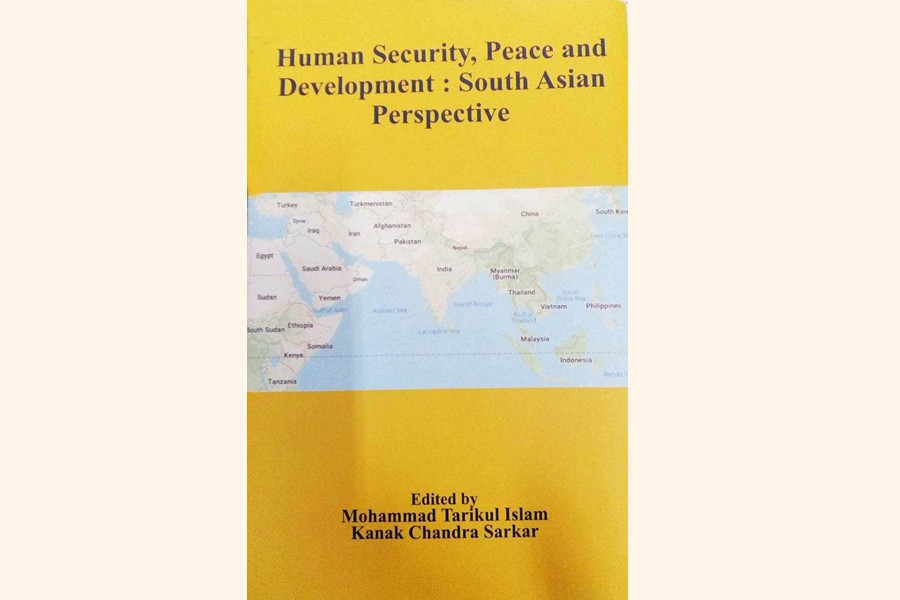
Published :
Updated :

Human security, peace and development are the three paradigms, which have been the agenda of state reforms with focus on two key areas - the creation of more effective and legitimate legal, administrative, financial and policymaking institutions; and the promotion of social justice and empowerment for poor people with participation of an active civil society. People believe the avowed objectives of any development work cannot be fully accomplished if people do not join it profoundly. It is apparent that people's participation in development projects may help bring an effective social change rather than imposing an external culture on a society.
Against this backdrop, the book Human Security, Peace and Development: South Asian Perspective edited by Mohammad Tarikul Islam (Assistant Professor in Government and Politics, Jahangirnagar University and Visiting Research Fellow, University of Oxford, UK) and Kanak Sarkar (Professor in International Relations, Jadavpur University, Kolkata, India) published by the Readers Service Kolkata is indeed a timely endeavour in the context of South Asia.
The book takes a unique approach by applying the concept of human security heading for peace and development. Published 24 years after the human security approach was first announced in the UNDP Human Development Report 1994, the book provides an important reassessment of the human security approach, demonstrating how it still has considerable relevance to the perspective of peace and development in South Asian settings.
The underlying fact is that political theorists, social commentators and even politicians believe that public participation increases public trust in authorities, improving citizen political efficacy, enhancing democratic ideals and even improving the quality of policy decisions. All men and women should have a voice in decision-making, either directly or through legitimate intermediate institutions that represent their interests, we believe. Processes, institutions and information are directly accessible to those concerned with them, and enough information is provided to understand and monitor them. Institutions and processes try to serve all stakeholders.
The non-traditional security approach has been an emerging paradigm over the years for understanding global vulnerabilities whose proponents challenge the traditional notion of national security by arguing that the proper referent for security should be the individual rather than the state. Human security holds that a people-centred view of security is necessary for national, regional and global stability. It helps state and society to safeguard the vital core of all human lives from critical pervasive threats, in a way that is consistent with long-term human fulfilments.
South Asia is struggling to uproot the colonial legacy of development paradigm by bringing about the elusive phenomenon of people's participation in development initiative which was ignored and remained only on papers as a striking slogan over the decades. It is deceptive that participation is the key to inclusion of community people in development efforts and human element in development efforts persuades managing change in an effective manner. Participation, on the other hand, an operative means for such people, seeks to have some influence and to gain access to the resources which would help them sustain their living standards with the sense of dignity.
The book is organised into thirteen broad chapters. This excellent collection contributed by the scholars from different universities of India, Nepal and Bangladesh takes the human security debate forward by focusing upon nodes of peace and development. Community development in South Asia primarily means encouraging rural people to become self-reliant making them capable of enlightening their participation in socio-economic development and nation-building measures through mobilisation and utilisation of resources. Governance and policy enable sustaining of development goals.
It could be debated that participation as an alliance is the interpretation which dominates much of the practice of current development programmes and projects. Gradually participation has been named as an exercise of empowering people and has gained wide public support and the term has been accepted into development vocabulary. People-centred development endows community to argue their choice for own contentment. Time is cracking in and around to come around to ask what kinds of reasoning should count in the assessment of the development paradigm where human elements are hardly touched upon.
The current endeavour has briefly examined the influence of people at the heart the of development process of Bangladesh and their participation on the top. A number of scholars in different fields endeavoured to encompass emerging issues in South Asia like Democracy, Political Parties, Election; Bilateral Relations; Human Security; Conflict Resolution; Press Freedom and so on.
We are definitely thankful to Prof. Islam and Prof. Sarkar for producing such a commendable academic piece of work. Indeed, this edited volume is considered as a valuable academic resource for our social and political science disciplines. It's a thought-provoking and very insightful one. The book is an essential read for the students of Political Science, Peace and Security Studies, and International Relations and Diplomacy.
nashir@gmail.com


 For all latest news, follow The Financial Express Google News channel.
For all latest news, follow The Financial Express Google News channel.